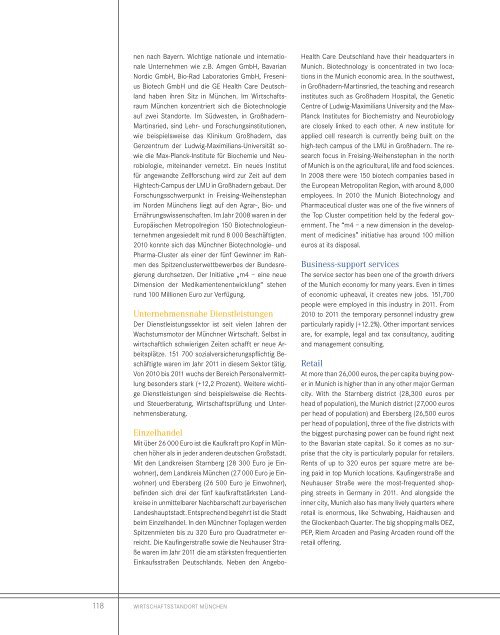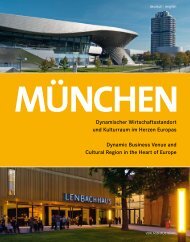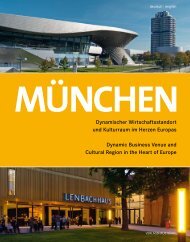Buch_Muenchen
You also want an ePaper? Increase the reach of your titles
YUMPU automatically turns print PDFs into web optimized ePapers that Google loves.
nen nach Bayern. Wichtige nationale und internationale<br />
Unternehmen wie z.B. Amgen GmbH, Bavarian<br />
Nordic GmbH, Bio-Rad Laboratories GmbH, Fresenius<br />
Biotech GmbH und die GE Health Care Deutschland<br />
haben ihren Sitz in München. Im Wirtschaftsraum<br />
München konzentriert sich die Biotechnologie<br />
auf zwei Standorte. Im Südwesten, in Großhadern-<br />
Martinsried, sind Lehr- und Forschungsinstitutionen,<br />
wie beispielsweise das Klinikum Großhadern, das<br />
Genzentrum der Ludwig-Maximilians-Universität sowie<br />
die Max-Planck-Institute für Biochemie und Neurobiologie,<br />
miteinander vernetzt. Ein neues Institut<br />
für angewandte Zellforschung wird zur Zeit auf dem<br />
Hightech-Campus der LMU in Großhadern gebaut. Der<br />
Forschungsschwerpunkt in Freising-Weihenstephan<br />
im Norden Münchens liegt auf den Agrar-, Bio- und<br />
Ernährungswissenschaften. Im Jahr 2008 waren in der<br />
Europäischen Metropolregion 150 Biotechnologieunternehmen<br />
angesiedelt mit rund 8 000 Beschäftigten.<br />
2010 konnte sich das Münchner Biotechnologie- und<br />
Pharma-Cluster als einer der fünf Gewinner im Rahmen<br />
des Spitzenclusterwettbewerbes der Bundesregierung<br />
durchsetzen. Der Initiative „m4 – eine neue<br />
Dimension der Medikamentenentwicklung“ stehen<br />
rund 100 Millionen Euro zur Verfügung.<br />
Unternehmensnahe Dienstleistungen<br />
Der Dienstleistungssektor ist seit vielen Jahren der<br />
Wachstumsmotor der Münchner Wirtschaft. Selbst in<br />
wirtschaftlich schwierigen Zeiten schafft er neue Arbeitsplätze.<br />
151 700 sozialversicherungspflichtig Beschäftigte<br />
waren im Jahr 2011 in diesem Sektor tätig.<br />
Von 2010 bis 2011 wuchs der Bereich Personalvermittlung<br />
besonders stark (+12,2 Prozent). Weitere wichtige<br />
Dienstleistungen sind beispielsweise die Rechtsund<br />
Steuerberatung, Wirtschaftsprüfung und Unternehmensberatung.<br />
Einzelhandel<br />
Mit über 26 000 Euro ist die Kaufkraft pro Kopf in München<br />
höher als in jeder anderen deutschen Großstadt.<br />
Mit den Landkreisen Starnberg (28 300 Euro je Einwohner),<br />
dem Landkreis München (27 000 Euro je Einwohner)<br />
und Ebersberg (26 500 Euro je Einwohner),<br />
befinden sich drei der fünf kaufkraftstärksten Landkreise<br />
in unmittelbarer Nachbarschaft zur bayerischen<br />
Landeshauptstadt. Entsprechend begehrt ist die Stadt<br />
beim Einzelhandel. In den Münchner Toplagen werden<br />
Spitzenmieten bis zu 320 Euro pro Quadratmeter erreicht.<br />
Die Kaufingerstraße sowie die Neuhauser Straße<br />
waren im Jahr 2011 die am stärksten frequentierten<br />
Einkaufsstraßen Deutschlands. Neben den Angebo-<br />
Health Care Deutschland have their headquarters in<br />
Munich. Biotechnology is concentrated in two locations<br />
in the Munich economic area. In the southwest,<br />
in Großhadern-Martinsried, the teaching and research<br />
institutes such as Großhadern Hospital, the Genetic<br />
Centre of Ludwig-Maximilians University and the Max-<br />
Planck Institutes for Biochemistry and Neurobiology<br />
are closely linked to each other. A new institute for<br />
applied cell research is currently being built on the<br />
high-tech campus of the LMU in Großhadern. The research<br />
focus in Freising-Weihenstephan in the north<br />
of Munich is on the agricultural, life and food sciences.<br />
In 2008 there were 150 biotech companies based in<br />
the European Metropolitan Region, with around 8,000<br />
employees. In 2010 the Munich Biotechnology and<br />
Pharmaceutical cluster was one of the five winners of<br />
the Top Cluster competition held by the federal government.<br />
The “m4 – a new dimension in the development<br />
of medicines” initiative has around 100 million<br />
euros at its disposal.<br />
Business-support services<br />
The service sector has been one of the growth drivers<br />
of the Munich economy for many years. Even in times<br />
of economic upheaval, it creates new jobs. 151,700<br />
people were employed in this industry in 2011. From<br />
2010 to 2011 the temporary personnel industry grew<br />
particularly rapidly (+12.2%). Other important services<br />
are, for example, legal and tax consultancy, auditing<br />
and management consulting.<br />
Retail<br />
At more than 26,000 euros, the per capita buying power<br />
in Munich is higher than in any other major German<br />
city. With the Starnberg district (28,300 euros per<br />
head of population), the Munich district (27,000 euros<br />
per head of population) and Ebersberg (26,500 euros<br />
per head of population), three of the five districts with<br />
the biggest purchasing power can be found right next<br />
to the Bavarian state capital. So it comes as no surprise<br />
that the city is particularly popular for retailers.<br />
Rents of up to 320 euros per square metre are being<br />
paid in top Munich locations. Kaufingerstraße and<br />
Neuhauser Straße were the most-frequented shopping<br />
streets in Germany in 2011. And alongside the<br />
inner city, Munich also has many lively quarters where<br />
retail is enormous, like Schwabing, Haidhausen and<br />
the Glockenbach Quarter. The big shopping malls OEZ,<br />
PEP, Riem Arcaden and Pasing Arcaden round off the<br />
retail offering.<br />
118<br />
Wirtschaftsstandort München




